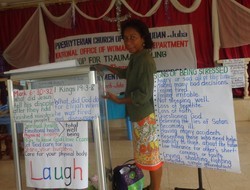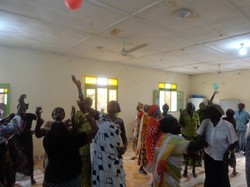I sometimes think about and long for all of those things that were lost to looting during the continuing battles and insecurity in Malakal.
Then I remember that my colleagues, new friends and the entire population of that town also lost everything, and more: documents, livelihoods, land, crops, sense of well-being and identity, and even their lives or the lives of many of their family members.
I had options as to where I could go for safety, a family to take me in, and an entire denomination that was nurturing me in prayer and providing other forms of support.
Your interest in the welfare of people here has been phenomenal. You have taken on the role of an extended family seeking ways to share in the burdens of your brothers, sisters and children who just want a chance to live. You are praying for a return to a better normalcy and you have dug deep into your hearts and pockets in practical ways.
More important, we are on the wings of your prayers. Thank you and know that we, too, are continuing to pray without ceasing — for each other and for you. Please continue your various ministries of support to these hurting people.
The latest outbreak of cholera and hepatitis E are two more burdens on the hearts of the South Sudanese, but there is a strong faith that this, too, shall pass. When I meet the children in my neighborhood, we sometimes talk about cholera and how we can work together to lessen our chances of contracting it.
They get a kick out of teaching me the Arabic words associated with the infection. Although we do a lot of laughing together — at my expense as I falter in this language — we know that the disease is a very serious matter that can negatively affect their future ability to rise above their immediate reality.

Leisa Wagstaff leads a Trauma Healing Workshop session. —Courtesy of Leisa Wagstaff
Recently I helped to facilitate a trauma-healing workshop for 60 women who are living in Juba, the capital city. Many of them hail from other parts of the country but because of the ongoing conflict are trying to make a “home” in one of the two nearby United Nations internally displaced persons’ (IDP) camps. Just hearing their stories of loss and incredible survival was humbling.
One woman shared how she struggled to run from Malakal to her village hundreds of miles away. With a baby tied on her back, a toddler in tow, a small bundle of food rations and essential possessions on her head, and gunshots and screams filling her ears, she almost gave up.
In the midst of the chaos a man in the same predicament grabbed up her toddler and began to run alongside her. That they were from different ethnic groups was far from importance at the moment — only their common goal, survival, and the realization that “I am because you are.”
She provided cover for him along their treacherous escape route, where he was the targeted ethnicity and he carried her child, whose mind could only comprehend fear but whose small legs could not run the distance.
Not wanting to be detected in the bush and needing to save every ounce of strength for their journey probably made conversation impractical. I imagine, though, that they spoke to one another in their hearts as they gave thanks for the other’s help and prayed for protection of not only themselves but their accompanying sojourner as well.
At the juncture where they separated I envision them giving the traditional embrace: a right hand near the other’s heart. How her fellow traveler fared is unknown.
What is known by this lady and all those within her hearing is that they were just two people — no difference — who had gotten caught up in a war not of their making but whose very existence depended upon the other.
I hope and pray that through our time together these women and I have begun to truly release the wounds of our hearts to Jesus and can cease dwelling on what used to be or revenge for those who we feel helped to perpetuate this war or those who belong to the ethnic group that destroyed our homes and/or injured, killed or raped loved ones.
As a part of releasing some of our heart pains I led us into a cooperative task of a play nature that would allow us to laugh and rejuvenate. With only three balloons (13 out of the 16 I had managed to find in a remote corner store had holes in them!) the 61 of us were able to forget — if only for a few minutes — and just be carefree. Even I did not know the enormous impact that such a seemingly small offer would have.
We were so engaged in the being and working together and sharing the joy of play that only with the bursting of those three balloons were we able to bring the day’s last session to an end.
Even then there was continuous laughter as we recounted how we had managed to work together to keep the balloons afloat. As a group of participants were filing out to take public transport back to their “homes” in the IDP camps, I overheard one woman say, “God has smiled on me this day. I never thought I could ever laugh again!”
Those with her nodded their heads vigorously in agreement while another exhaled sharply, wiped a tear, and straightened her back.
I, too, smiled in remembrance, brushed at a few streaming tears, and thanked God for giving us avenues for healing and these precious moments of laughter and oneness.

